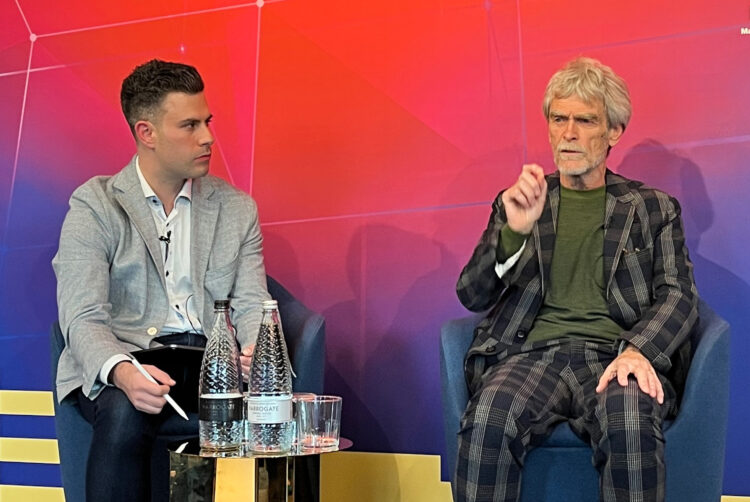Sir John Hegarty: ‘Britain has dull businesses’

The Future of Brands 2023
The BBH founder decried the state of British brands and downplayed the effects of media fragmentation on the ability to cut through.
“One of the failures of the British economy is that we haven’t come up with good brands.”
Speaking at The Future of Brands 2023 conference in London Wednesday, advertising executive and founder of agency Bartle Bogle Hegarty (BBH) decried the current state of advertising, arguing that most brands today are failing to be sufficiently exciting and important in the everyday lives of consumers.
The discussion echoed points he made on The Media Leader Podcast, where he insisted “the big idea” is still the most effective way to sell products and services to consumers. He pulled no punches then, rating the state of creativity in marketing today as “a four [out of ten].”
At The Future of Brands, Hegarty told The Media Leader‘s editor Omar Oakes that both agencies and marketers are at fault for the poor state of the industry, arguing that the problem with ad agencies is that they try to be all things to all people. “They’re all on Oxford Street when they need to be on Bond Street,” Hegarty said.
To Hegarty, the best brands endlessly promote, and do so in creative ways that manufacture a sense of importance and interest. “James Dyson made a vacuum cleaner interesting,” he said to a chorus of laughter. “You’ve got to make yourself as interesting as the latest Bond film. […] If you’re not thinking like that, you’re failing.”
Hegarty named the likes of Paul Smith, the BBC, and HBO as brands he admires. The latter’s branding is set to weaken this year, as Warner Bros Discovery renames its new combined streaming service between HBO Max and Discovery+ simply ‘Max’.
He also named Oatly as a newer brand that has excited him. “Really interesting brands think like movements,” he said, noting that Oatly’s elevation of making milk-alternatives fashionable and important to society is exactly what brands should aspire to.
No point for brands to cynically do purpose-based advertising
While making a brand into a movement may be a great goal, Hegarty expressed severe dislike of purpose-based advertising.
“We’ve misunderstood ‘purpose’,” he said, adding that brands should stay in their lane and promote causes that are relevant to their products. Advertising around broader issues, such as the Black Lives Matter movement, without a direct connection to your brand, is cynical, according to Hegarty.
“Associating yourself with something you don’t do is nonsense,” he told the audience. He cited the much-derided 2017 Pepsi advertisement featuring Kendall Jenner as a particularly bad example of the practice, but noted it’s an industry-wide problem.
Nic Keaney, the recently-hired managing editor of PinkNews, pushed back on Hegarty, asking him whether he thinks its important for brands to provide inclusive platforms through advertising around social issues. Sir John replied that inclusivity is “fundamentally important, but I’m wary of cynicism”, adding: “you should naturally include people” rather than shoehorn diverse representation and purpose into campaigns just to tick boxes.
“Creativity thrives on diversity,” he said. “More diversity creates opportunity.”
Media fragmentation concerns are overexaggerated
Later in the conversation, Hegarty argued that concerns over media fragmentation are overblown. The notion that sufficiently good creative can’t necessarily find a way to cut through and make a cultural impact regardless of how scattered media consumption becomes is “bullshit”.
“We’ve always had a fragmented media industry,” he said, telling the crowd that he’s been having this very same conversation since 1984. “If you want to succeed in this world, your idea needs to be bigger, it needs to be better, it needs to be true to who you are.”
Sir John Hegarty: ‘the big idea’ still matters for the future of brands
Hegarty jokingly added that Elon Musk probably doesn’t think too much about media fragmentation. Instead, he shoots a Tesla into space to promote his car company.
In fact, increasingly fragmented media can be seen in a more positive light. “It is easier today to start a brand and turn it into a success than it was 40 years ago”, said Hegarty. The influencer economy and social media has had a great democratising effect on brand building, which Hegarty believes has the power to uplift the best and most diverse creative minds.
Greater investment in creative needed
While Hegarty told the crowd that he thinks Britain is a very naturally creative country, its “dull businesses” and government leadership are stymying creative impulses. In an explicit declaration of disapproval, Hegarty implored the audience to “vote the Tories out!”
“We don’t have a government that understands how to promote a creative workforce,” he said, adding that the overemphasis on education in STEM has not sufficiently taught children the values of creative enterprise in the information age.
When asked how to stay creative in an age where everyone is constantly inundated with information, Hegarty said we need to become better at understanding how to filter out the bad from the good.
“If you read shit, you’ll learn shit, and you’ll create shit,” he said.




